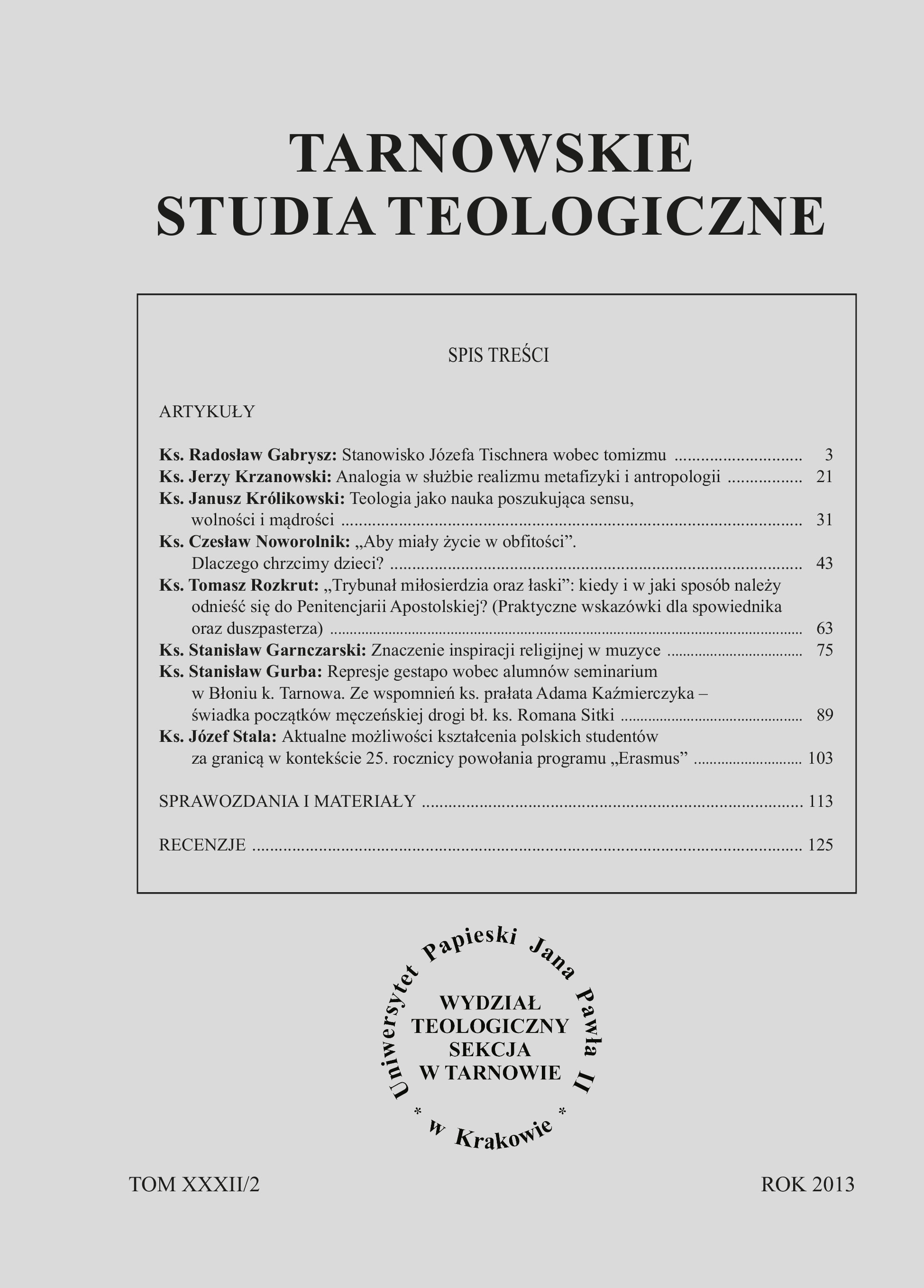Znaczenie inspiracji religijnej w muzyce
DOI:
https://doi.org/10.15633/tts.323Słowa kluczowe:
inspiracja religijna, wiara, sztuka, chorał gregoriański, msza, oratorium, pasja, kantata, Biblia, liturgiaAbstrakt
The issue of religious inspiration in the music is complex and multifaceted, rooted in the vast area of faith (internal, deeply personal) and art. In the present study was undertaken reflection on two kinds of inspiration: biblical, liturgical or religious text in general and sacred music motives and precisely liturgical.
First, a significant source of inspiration is own singing of the Catholic Church – Gregorian chant, which in the Middle Ages was the main stream of sacred music, and became a source of development of polyphony, as its cantus firmus. Culmination of the polyphony development was the work of P. Palestrina. From the religious inspiration drew the composers of all eras in the history of music. In the Baroque period developed next to a popular mass such forms as oratory, its particular variant – passion and cantata. Also the form of instrumental music, especially organ (J.S. Bach, J.F. Handel). In the classicism religious music formed mainly three Viennese classicists: J. Haydn, W.A. Mozart and L. van Beethoven. Composed by them religious music bears the features of instrumental music of the period, as well as signs of secular vocal and instrumental music. The composers of the Romantic period are fulfilled in the form of a classical type of cantata mass or a symphony mass. In Poland in the field of religious music marked S. Moniuszko. Nowadays, the example of the composer inspired by religious contents is Krakow composer J. Łuciuk, forming based on Gregorian chant, biblical and liturgical texts, inspired by the person and the pontificate of John Paul II and the Marian theme. He confirms this, saying, “Poetry and literature, as faith and prayer, are inextricably linked with what I write. Always important and inspiring was the reflection associated with the reading of Scripture, liturgical texts, lives of the saints and papal documents”.
Pobrania
Opublikowane
Numer
Dział
Licencja
Prawa autorskie (c) 2013 Stanisław Garnczarski

Utwór dostępny jest na licencji Creative Commons Uznanie autorstwa 4.0 Międzynarodowe.
Autorzy publikujący w czasopiśmie udzielają jego wydawcy zgody o następującej treści:
- Autor zachowuje autorskie prawa majątkowe do utworu, a jednocześnie udziela wydawcy czasopisma zgody na jego pierwszą publikację w wersji drukowanej i wersji online na licencji Creative Commons Uznanie autorstwa 4.0 Międzynarodowe oraz zgody na wykonywanie opracowań, w tym przekładów.
- Autor ma możliwość udzielania zgody niewyłącznej na opublikowanie utworu w wersji, która ukazała się w czasopiśmie (np. zamieszczenia go w repozytorium instytucjonalnym lub opublikowania w książce), wraz z informacją o jego pierwszej publikacji w czasopiśmie.
- Autor może umieścić swój utwór online (np. w repozytorium instytucjonalnym lub na swojej stronie internetowej) jeszcze przed zgłoszeniem utworu do czasopisma.

